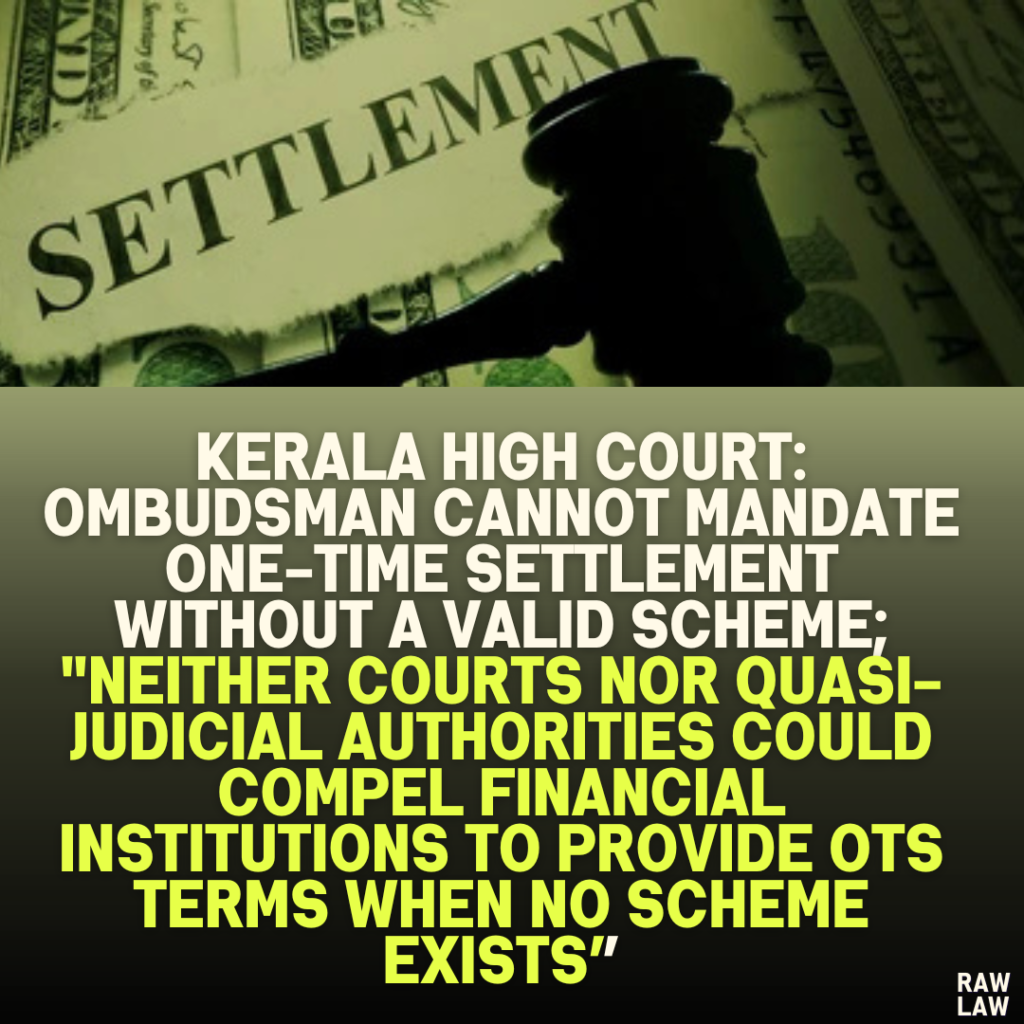Court’s Decision:
The Kerala High Court, in its judgment, set aside the order issued by the Kerala Co-operative Ombudsman directing the petitioner, a co-operative bank, to facilitate a One-Time Settlement (OTS) for the complainant. The court observed that the Ombudsman overstepped its jurisdiction by mandating an OTS when no valid scheme was in place. The court, however, provided an alternative resolution by permitting the complainant to settle the outstanding dues with concessions voluntarily offered by the bank.
Facts of the Case:
- Parties Involved: The petitioner was a co-operative bank operating in Kerala, and the respondent was a borrower who had approached the Ombudsman for relief.
- Ombudsman’s Order: The Kerala Co-operative Ombudsman directed the petitioner bank to provide feasible relaxations in interest and charges to facilitate a One-Time Settlement for the complainant’s loan.
- Petitioner’s Stance:
- The petitioner bank argued that the OTS scheme approved by the government had expired on July 31, 2024, as per Circular No.18/2024.
- They contended that no such scheme was currently in force, rendering the Ombudsman’s order unexecutable.
- Outstanding Loan:
- As of November 21, 2024, the respondent owed the bank a total of ₹38,34,020.
- The petitioner proposed waiving ₹2,44,601 in penal interest, reducing the payable amount to ₹35,89,419, subject to settlement within the court’s stipulated timeframe.
Issues:
- Validity of the Ombudsman’s Order: Could the Ombudsman enforce a One-Time Settlement when no valid scheme was in force?
- Judicial Oversight: To what extent can courts or quasi-judicial authorities modify or enforce terms of financial agreements under Article 226 of the Constitution?
Petitioner’s Arguments:
- Legal Framework:
- The petitioner cited the judgment of the Supreme Court in State Bank of India v. Arvindra Electronics Private Limited [(2023) 1 SCC 540], which held that courts or authorities could not extend or impose OTS terms when no valid scheme exists.
- Infeasibility of Ombudsman’s Order:
- The petitioner argued that the Ombudsman’s directive was illegal as the government-approved OTS scheme had already lapsed, and no new scheme was in force.
- Alternative Proposal:
- As a gesture of goodwill, the bank proposed waiving penal interest to an extent of ₹2,44,601, provided the respondent settled the remaining amount within one month.
Respondent’s Arguments:
- The second respondent (complainant) did not appear to contest or present arguments during the proceedings.
Analysis of the Law:
- OTS Guidelines:
- The concept of an OTS is governed by specific schemes approved by the government or financial institutions. These schemes are time-bound and conditional.
- Once an OTS scheme expires, financial institutions are under no obligation to offer similar terms unless a new scheme is introduced.
- Judicial Oversight:
- The High Court referred to State Bank of India v. Arvindra Electronics Private Limited [(2023) 1 SCC 540], where the Supreme Court underscored that neither courts nor quasi-judicial authorities could compel financial institutions to provide OTS terms when no scheme exists.
- Role of the Ombudsman:
- The Ombudsman’s powers are limited to addressing grievances within the scope of applicable laws and schemes. The court found that the Ombudsman exceeded its jurisdiction by directing an OTS in the absence of a valid scheme.
Precedent Analysis:
- State Bank of India v. Arvindra Electronics Private Limited [(2023) 1 SCC 540]:
- Held that courts or authorities cannot compel financial institutions to modify or extend OTS terms under Article 226 unless there is an existing scheme.
- This precedent was directly applicable to the present case, reinforcing the petitioner’s contention.
Court’s Reasoning:
- Invalidity of Ombudsman’s Order:
- The court concluded that the Ombudsman’s directive was unenforceable as no valid OTS scheme was in force.
- Concessions Voluntarily Offered:
- The petitioner bank’s willingness to waive penal interest demonstrated a practical approach to resolving the dispute, which the court found reasonable.
- Balance of Interests:
- The court sought to strike a balance between protecting the financial institution’s rights and providing relief to the respondent by facilitating a feasible settlement plan.
Conclusion:
- Order Set Aside:
- The High Court quashed the Ombudsman’s order (Ext.P4) as being without legal basis.
- Alternative Relief:
- The court directed the respondent to settle the loan by paying ₹35,89,419 (after deducting the waived penal interest) within one month, along with any applicable interest and charges.
Implications:
- Reaffirmation of Legal Principles:
- This judgment reaffirms the principle that judicial or quasi-judicial authorities cannot impose terms outside the scope of existing schemes or laws.
- Clarity for Financial Institutions:
- The ruling provides clarity to banks and financial institutions on the limits of the Ombudsman’s powers and the enforceability of expired schemes.
- Protection for Borrowers:
- While the court set aside the Ombudsman’s order, it also ensured a reasonable concession for the respondent, promoting fairness in financial disputes.



